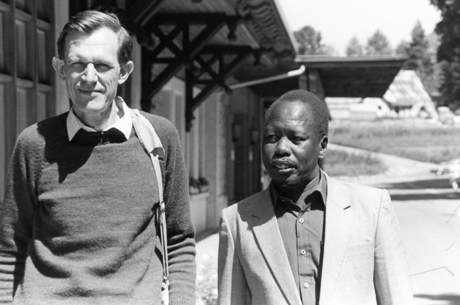Francis Evans wrote to me in February: "My request is whether you, Peter, would speak about the most precious things from a lifetime’s commitment that you would want to pass on to [the younger] generation."
For those who don't know me, IofC propelled me in my student days into a life work with the African, Arab and Muslim worlds, which started with eight years teaching in Sudan. I have been back there on 22 visits, and am now closely following events in South Sudan.
The most precious thing I can bear witness to is that God has a plan for the world, and each of us has a part; secondly, when people change, nations can change. I believe UK is called to be a servant and partner to countries we once ruled.
We older ones have a duty to pass on what we have learned to the next generation. We have to be careful how we do it. One day a younger person was heard to say, "I have given my life to God, but I hope I don't have to spend most of it with Peter Everington." Now we can do less, we have to help younger people more. We ourselves still need a great purpose to get our teeth into -- assuming we still have enough teeth!
I'm not much good at describing "the most precious things" in the abstract. So I'm going to illustrate them through Africa. On Monday there was that service in Westminster Abbey giving thanks for Nelson Mandela. He and Desmond Tutu, by their living, have taken the word reconciliation from the Bible and put it into the language of politics and academia. This last week our friend Amina Dikedi travelled to Ethiopia for a conference to coordinate the programme of IofC with Africans from eleven countries. Some of them may meet with South Sudanese friends to plan for reconciliation in that troubled country. Amina asked for thoughts on what to suggest to them, and here is some of what I wrote to her:
"Frank Buchman used to quote the words of William Penn, Men must choose to be governed by God, or they condemn themselves to be ruled by tyrants. How can a country be governed by God? How can a group of active patriots arise who help that to happen in very practical ways? That is a challenge for all our countries. The South Sudanese will find their own routes and methods. They have some noble examples, for instance General Joseph Lagu, the guerilla commander who became a peacemaker. He learned from his school chaplain that the good Lord can put thoughts into our minds at any time, especially when we lie awake in bed. Lagu was obedient to such thoughts at a crucial moment in his struggle. Peace, justice and prosperity for his country at that time sprang from his obedience.
"How do we know clearly where our community or country needs to change? How do we go about that change? We can take time alone in silence to measure ourselves against standards of absolute honesty, purity, unselfishness and love. Stolen money or property to give back? Wrong habits or relationships to stop? Jealousies to admit? Apologies to make to God and people? Killing, the lust to kill, the quiet enjoyment of others killing? However much we've suffered, however much we've made others suffer, there is forgiveness to receive and give, and restitution to make. Our own pride, greed and hate are our biggest enemies. The victories God gives us over them are our chief weapons in helping other difficult people like ourselves to change.
"Our morning times of listening for God's guidance, in teamwork with other people, will help fulfil the righteous longings of our nation. They can also help reset relations with other countries. Can the SPLM (Sudan Peoples Liberation Movement) reset its philosophy to this deeper level of reconciliation, where the living God overrules our human weakness, and sets the nation on the path of moral and spiritual renewal?
"And what about the fighters, those who fought long for independence, and those now in civil war? For them there is a greater battle. It requires more courage than the war of arms. The Catholic Catechism calls it The Battle for Purity. This is the eternal struggle which goes on in all our hearts, and all our communities, for all our lifetime. Purity is the quality that makes real men and real women, and distinguishes us from animals. It is the battle for clean water, clean food, clean sex, clean money, clean homes, clean education, clean governance, and clean politics. It is a battle we cannot fight alone. We need God's grace and each other's help every day. The battle for purity makes the difference between whether or not a person or a community can be trusted.
"This is a battle we fight if we truly love our family and community. It is a battle that will bring us into comradeship with former enemies, and deepen the integrity of our best institutions. It is a battle for all patriots. It brings out the true greatness of a people, and liberates us from all evil. It is a place of sanctuary for children, women and men. It establishes our basic dignity as human beings and servants of the One God."
This is what I wish for South Sudan, a country I love, and for UK equally. And I look forward to hearing today from valiant friends at work in this spirit.
The book to read on all this is The Spiritual Vision of Frank Buchman. How fortunate we are to have Philip Boobbyer at our helm now [Chair of IofC UK], steeped as he is in the thinking of Russia and in the Christian heritage of Europe.
English

